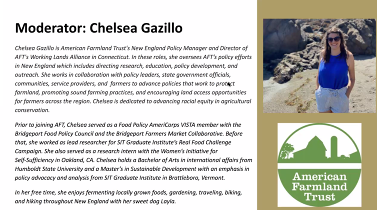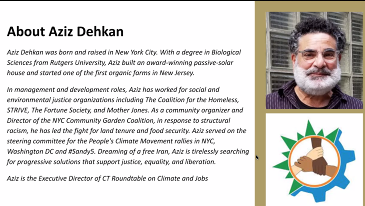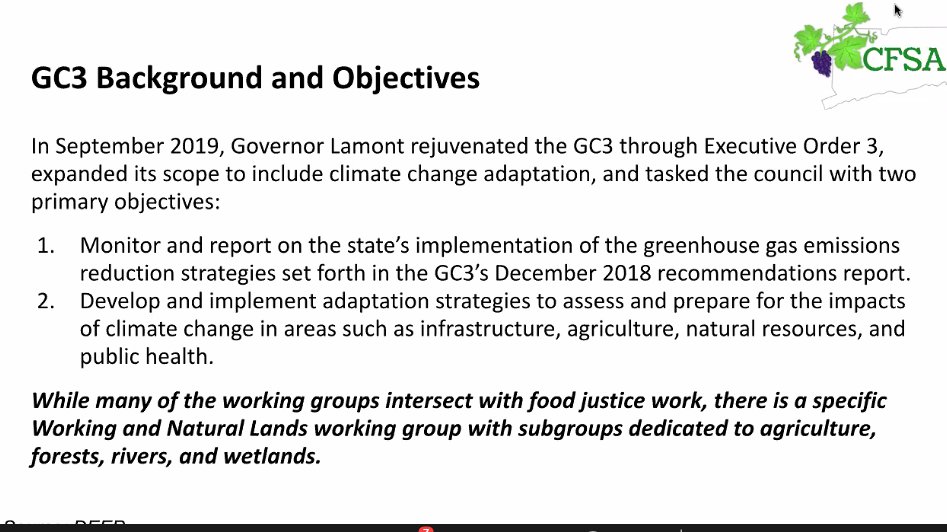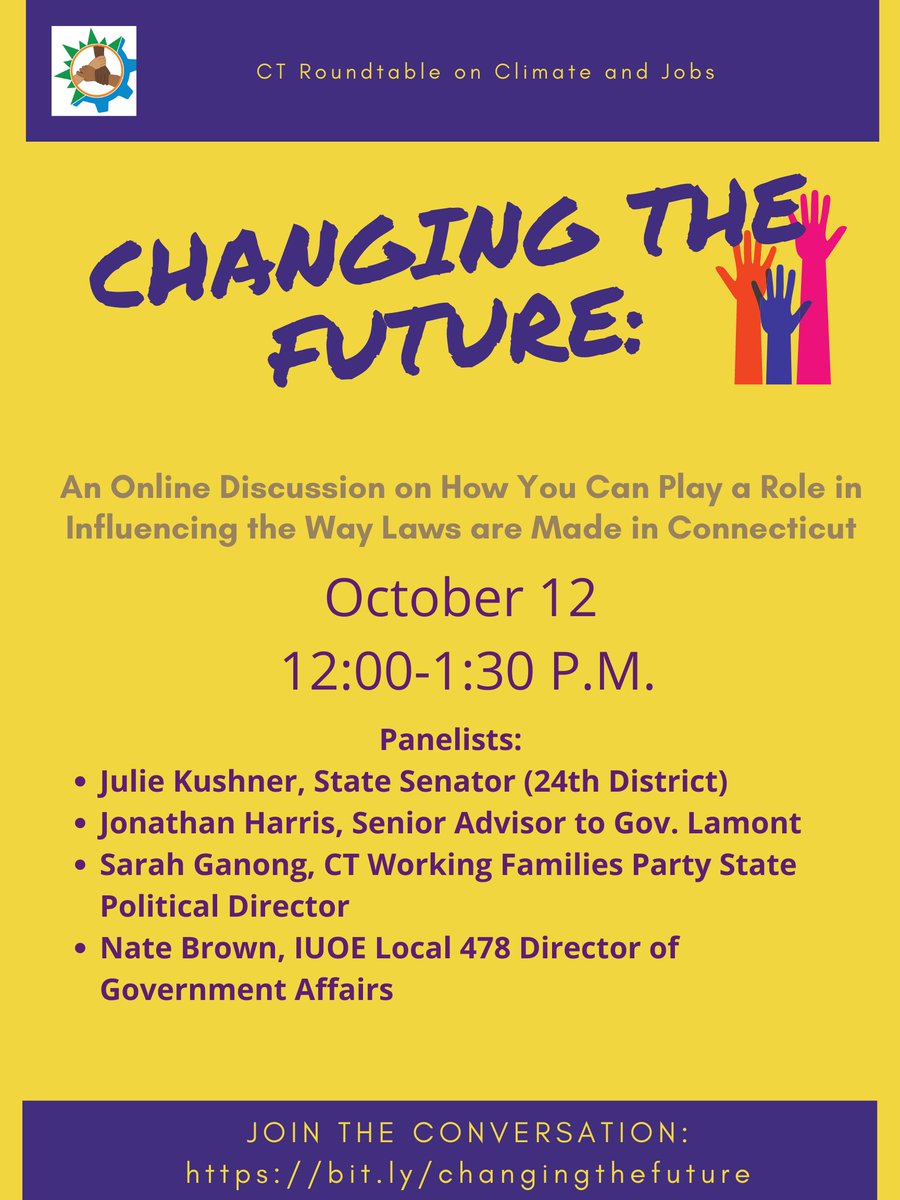
Welcome to Climate & Connecticut's Food System! Today's panelists are @ctclimatejobs Executive Director Aziz Dehkan and Kip Kolesinkas. Live Tweeting of this event will begin now. 

Martha Page, Executive Direct of Connecticut Food System Alliance: "The context for today's conversation is the code red alarm that climate is having an impact on agriculture. How do we craft a sustainable food system plan that can exist as we face changes in climate."
Martha Page: "Connecticut is the only state without a food action plan."
Kip Kolesinkas: "We have a food security challenge that is a national challenge and also a moral challenge."
Kip Kolesinkas: "Everything that they said (scientists) would happen with climate has happened and sometimes to greater severity than predicted."
Kip Kolesinkas: "Globally we see that people are displaced. We saee climate refugees at our borders and the failure of coffee crops are pushing people to migrate." 

Kip Kolesinkas: "We have seen areas where there is sometimes too much rain, and then later, not enough." 

Aziz Dehkan: "If you're going to rely on the federal government to change path when it comes to climate. You have to organize locally. It begins street by street. We need to find a different way to do this. We know multiple ways of doing this."
I don't want new normal when normal isn't working. We are on Zoom now because normal did not work. We need to be diligent in making sure we build out a green infrastructure and then make sure leaders know this."
Aziz Dehkan: "We need a sustainable model. We need to know how that sustainable model will look."
Question to Kip and Aziz: Discuss you participation in the GC3 efforts. Are there efforts that are critical that may not happen in the near future, but need to happen.
Kip Kolesinkas: "There will be additional pandemics and additional faminines and until we come to accept that people not feeding their own communities is a failed model, we will see more of this. It is a very complex, complex wicked problem."
Kip Kolesinkas: "Because GC3 was based on reducing emissions when we needed to address climate impacts on everyone. There is such a focus on renewable energies and not enough on human and natural systems. The greatest disappointment is not enough respect to green spaces."
Kip Kolesinkas: "Let's create incentives in the marketplace by paying what food actually costs and making sure all people can afford it."
Aziz Dehkan: "It's 2021, where are we with making sure transportation is meeting the need? The data says 28% of Connecticut residents do not have cars. How do you rectify the transportation system so that it meets people's needs and doesn't affect the environment."
Aziz Dehkan: "Take the money that you are giving to the fossil fuel industry and give it to creating buses that don't release these carbons and making sure there are electric charging stations."
Kip Kolesinkas: "There's a really good equity, inclusion section there (GC3) that relates to outreach and I recommend people take a look at those sections."
Kip Kolesinkas on policy recommendations for next legislative session: "There is an opportunity to help agriculture by mitigating emissions by eating less meat, preventing food waste, building soil health. Changing our forest management we can store additional carbons." 

Kip Kolesinkas: "There are opportunities where we can do these things. Each and every decision farmers make, they need to have climate change on the back of their minds from seed purchases to vehicle purchases." 

Kip Kolesinkas: " We have access to farmers who are recent immigrants that have a lot to teach us. They may have experience in dealing with hotter temperatures. Indoor agriculture is also another piece to look at." 
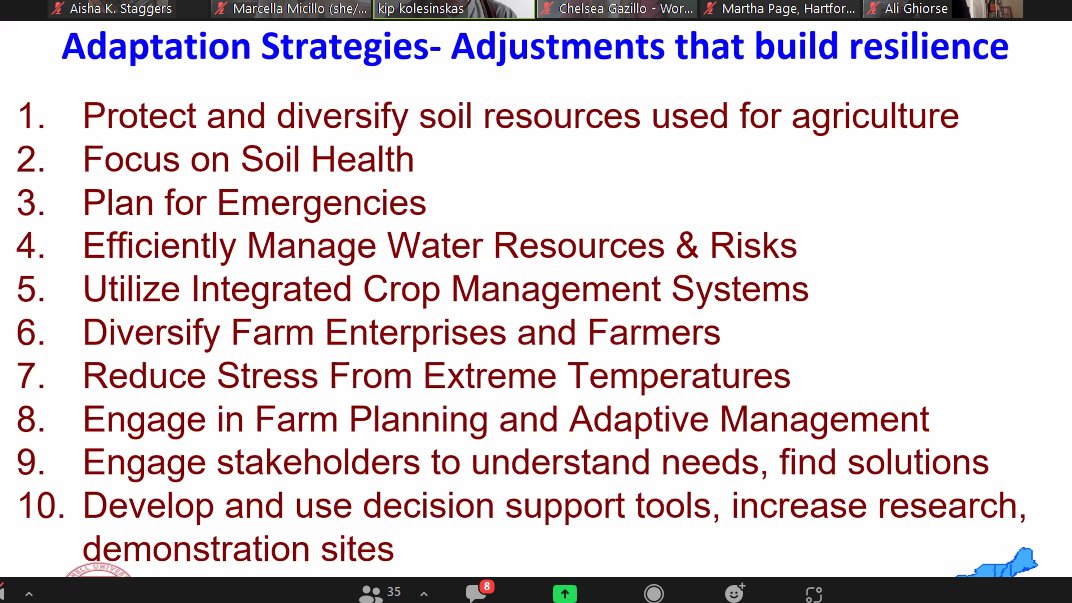
Aziz Dehkan: "I think the real research for farmers is with farmers themselves. We have to look at a smaller model. This country loves big. I think we need to go smaller. Small farms are what we need to look to. What small farmers know best is how to deal with climate."
Aziz Dehkan: "Farming is like organizing. You have to go farm by farm in order to change things."
Question: "Is there a technology where we can grow the foods in Connecticut that are grown in hotter climates and if not, why aren't we partnering with places like Puerto Rico where they are familiar with this?"
Aziz Dehkan: "We need to change our eating habits, truthfully. It may not just be in partnerships. There are answers, but we don't know all of them."
Kip Kolesinkas: "People should be feeding their own communities before looking to imported foods. The coastal areas are some of our few subtropical agricultural regions that we have not done a good job in protecting them from sprawl."
Chelsea Gazillo: "If we want to think about this from a food justice lens, we jave to not police people's eating habits, but we have to make sure people can afford food."
Angel Serrano: "In my community, meat is very big in the culture. To get away from meat, I don't think that will happen. In Puerto Rico, there's opportunity for farmers to make money. Why are we paying South America to grow our food, but not P.R. where have political interests?"
Here is the report from the GC3 Ag. and Soils Working Group: portal.ct.gov/-/media/DEEP/c…
Here is the Phase 1 Report portal.ct.gov/-/media/DEEP/c…
Here is CT's Climate Change Preparedness Plan from 2010 that Kip Kolesinkas mentioned: portal.ct.gov/-/media/DEEP/c…
Question to panelists: What are the strategies you have presented in your work that you see impacting climate and food?"
Aziz Dehkan: "@ctclimatejobs has been working on this by passing SB 999 and getting the trades involved in this. The trades are worried that a just transition will put them out of work as we move from fossil fuels. Trades, farmers, food and energy are intersectional here."
Aziz Dehkan: "The @ctclimatejobs tries to view Connecticut, if not the world, from an equity lens."
Kip Kolesinkas: "The rush towards renewables has been without understanding the unintended consequences on our agricultural lands. We know there are tools to can address these things." 

Kip Kolesinkas: "Unless we do something about the municipalities that do not contain agricultural in their planning, sprawl will continue to be a real an emerging threat."
Kip Kolesinkas: "Do our municipalities work to support agriculture and how to we get to a point that we are creating sustainable policies that affect food systems?"
Martha Page: "Connecticut Food System Alliance is a member of New England Feeding New England. The goal of the project is to figure out what will need to be done at the regional level for us to get to a 30 by 30 where 30% of food in Connecticut is grown in Connecticut by 2030."
Martha Page: "It's great work, it has the opportunity to bring a lot of processes together. We are not looking at these groups as separate. We are looking st how to integrate them all into our food system planning."
Chelsea Gazillo: "How do we prevent farmland from being used for development?"
Kip Kolesinkas: "The whole big picture of a systems approach is that there are not enough resources on this planet right now for everyone to live like we do or to think like we live. Many of the things we do should be doing them anyway to reduce carbon on our planet."
Kip Kolesinkas: "We really need to look at a systems approach for everything. Farmers making a living wage is also something that is a part of this. People can farm using techniques that protect the land and help people to think about their (crops) eventual demise."
Kip Kolesinkas: "Since we are a capitalist society, how do we create and induce incentives that help people move in the right direction. Also look at the different demographics- we have to look at what motivates them to doing this. We have to look for an alternative to 'normal'."
Kip Kolesinkas: "There are some many things we need to work on, but the solutions are out there."
Aziz Dehkan: "Kip's right. Change takes time and a different mindset. There are a couple modals that need to be discussed. Example: bee keeping on solar panels by planting certain flowers. You can get really sweet tasting honey from that planting between the panels."
Aziz Dehkan: "You can make some productive use of agricultural land and get out the mindset that nothing can be done because there are things that can be done."
Marcella Micillo: "How do we get someone to care that the produce/food we buy is not from Connecticut or from the United States?"
Kip Kolesinkas: "One of the ways you can make a difference is by your food choices. Begin asking where your food come from. Are the local cheeses really local? Why are you serving berries from Peru when there re berries that are locally grown?"
Kip Kolesinkas: "Not all local food will cost more when people are making a living wage creating our food."
Aziz Dehkan: Change is difficult, there are a lot of cultural influences we cannot ignore because if we don't we are only re-creating the same form of systemic racism (in agriculture) that we do everywhere else."
Aziz Dehkan: "Our plans should be as bold as they possibly can, but we have to use an equitable lens or else it won't be as viable a plan as we hope."
Kip Kolesinkas: "There's been some research done, a coworker of Chelsea's (Gazillo) has done where we can sequestor a huge amount of carbon in the soil. As far a nutrients is that they tend to leech, we have to manage them differently."
Question: "Does anyone know if the information can be readily available as people are making their food decisions in markets?"
Kip Kolesinkas: "It is easier to know where your produce is sourced than it is to know about where your eat comes from. There is more information when it comes to seafood."
Aziz Dehkan: "One final note, be aware of green washing." ~ END
@threadreaderapp unroll
• • •
Missing some Tweet in this thread? You can try to
force a refresh


